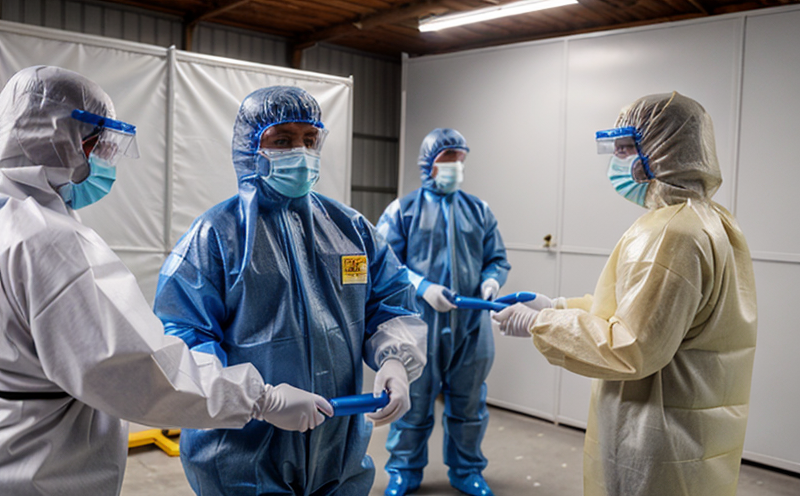ASTM F2703 Radiant protective performance of technical apparel
The ASTM F2703 standard specifies a method for measuring the radiant heat flux resistance of technical apparel materials used in protective clothing. This test is crucial for ensuring that garments provide adequate protection against thermal hazards, which can occur in industrial environments or during emergencies.
Protective clothing is designed to shield workers from exposure to various types of hazards, including extreme temperatures, flames, and other radiant heat sources. The performance of these materials directly impacts the safety of the wearer. ASTM F2703 provides a standardized procedure for assessing how effectively technical apparel can withstand such exposures without compromising the integrity of the fabric.
The test involves exposing samples of the technical apparel to radiant heat from an infrared source, simulating real-world conditions where the material may be subjected to high levels of thermal radiation. The key parameter measured is the radiant heat flux, which quantifies the amount of energy transferred per unit time through a specified area. By determining this value, manufacturers and users can evaluate whether the materials meet industry safety standards.
For accurate testing according to ASTM F2703, it's essential to follow strict procedures regarding specimen preparation. Samples must be cut from the fabric in accordance with the standard dimensions provided by ASTM. These samples are then conditioned under controlled environmental conditions before undergoing exposure tests. Proper conditioning ensures that any moisture content or temperature effects are minimized, leading to more reliable results.
During testing, the sample is placed between two plates within a specially designed chamber. One plate acts as an emitter of radiant heat while the other serves as a receiver for monitoring the transmitted flux. The sample is exposed to increasing levels of radiant heat until it either fails or reaches specified resistance limits. Failure typically occurs when there is visible damage through the fabric or if the temperature rises above predefined thresholds.
Testing laboratories must use appropriate equipment capable of generating controlled levels of radiant heat as per ASTM F2703 requirements. Commonly used apparatus includes infrared lamps, calorimeters, and thermal imaging cameras to measure both incident and transmitted flux accurately. Compliance with these specifications guarantees consistent results across different batches of fabric.
Acceptance criteria for passing this test depend on the specific application intended for the technical apparel being evaluated. Generally speaking, materials must demonstrate sufficient resistance levels based on their anticipated exposure scenarios. For instance, if the garment will be worn in close proximity to open flames or hot surfaces, higher resistance values may be required.
Understanding and implementing ASTM F2703 helps ensure that protective clothing offers reliable performance under severe thermal conditions. It plays a vital role in safeguarding workers by providing them with appropriate levels of protection against potential hazards. By adhering strictly to this standard during development stages, manufacturers can produce safer products tailored specifically for their target markets.
Eurolab Advantages
At Eurolab, we pride ourselves on offering comprehensive and accurate testing services that meet international standards like ASTM F2703. Our state-of-the-art facilities equipped with advanced instrumentation ensure precise measurements throughout the entire testing process.
- Accurate Measurements: We utilize high-precision equipment such as calorimeters and thermal imaging cameras to capture detailed data points during each test run, ensuring reliable results every time.
- Comprehensive Range of Services: In addition to ASTM F2703 testing, we also offer a wide array of other textile tests including flame resistance assessments, chemical resistance evaluations, mechanical strength determinations, and more.
- Experienced Experts: Our team consists of highly skilled professionals with extensive experience in both laboratory operations and industry applications. They stay updated on latest developments within the field to provide clients with cutting-edge insights and recommendations.
- Fast Turnaround Times: With efficient workflows and streamlined processes, we strive to deliver timely reports without compromising quality or accuracy.
- Compliance Assurance: Our rigorous adherence to international standards ensures that all test results are valid and reliable, meeting the stringent requirements set forth by regulatory bodies around the world.
Choose Eurolab for your ASTM F2703 testing needs. Trust us with your quality assurance efforts; we’re committed to delivering exceptional service tailored specifically to meet your unique requirements.
Why Choose This Test
- Enhanced Safety: Ensuring that protective clothing meets stringent safety standards helps prevent injuries caused by exposure to thermal hazards.
- Rigorous Testing: Conducted according to internationally recognized protocols, this test provides trustworthy results that can be relied upon when making purchasing decisions or certifying products for sale.
- Industry Recognition: Compliance with ASTM F2703 demonstrates a commitment to quality and safety, which is highly valued by customers seeking reliable protective solutions.
- Consistency Across Batches: By maintaining consistent testing procedures, manufacturers can produce batches of fabric that consistently meet the required resistance levels.
Selecting ASTM F2703 testing for your protective clothing ensures you're adhering to best practices and providing top-notch protection to those who rely on these garments daily. Don't compromise on safety; invest in thorough testing today!
Competitive Advantage and Market Impact
Incorporating ASTM F2703 into your product development process offers several strategic benefits that contribute significantly to competitive advantage:
- Enhanced Reputation: By demonstrating a commitment to safety through rigorous testing, you build trust with consumers who value quality and reliability.
- Innovation Leadership: Staying ahead of regulatory changes and industry trends positions your company as an innovator in protective clothing technology.
- Better Decision-Making: Accurate test results help guide decisions regarding material selection, design improvements, and process optimizations.
- Customer Satisfaction: Providing products that meet or exceed safety expectations leads to higher customer satisfaction and loyalty.
The global market for protective clothing continues to grow as awareness about occupational health hazards increases. By investing in ASTM F2703 testing, you position yourself as a leader in this dynamic field, ensuring continued success and growth.





